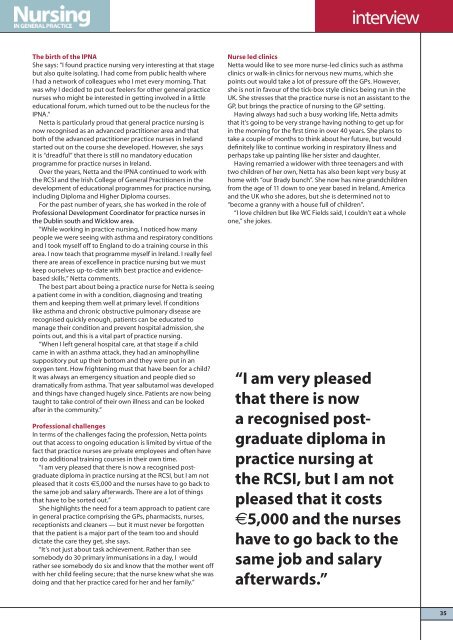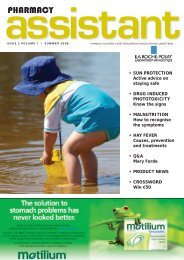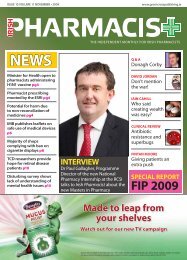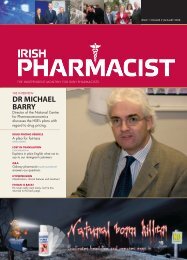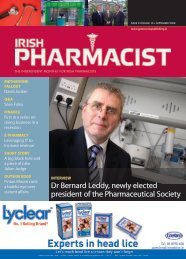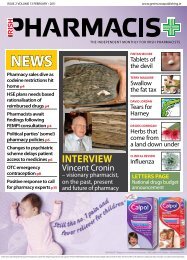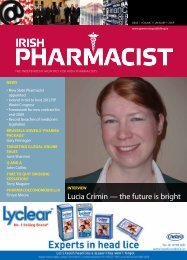veNTIlATIoN - Green Cross Publishing
veNTIlATIoN - Green Cross Publishing
veNTIlATIoN - Green Cross Publishing
Create successful ePaper yourself
Turn your PDF publications into a flip-book with our unique Google optimized e-Paper software.
The birth of the IPNA<br />
She says: “I found practice nursing very interesting at that stage<br />
but also quite isolating. I had come from public health where<br />
I had a network of colleagues who I met every morning. That<br />
was why I decided to put out feelers for other general practice<br />
nurses who might be interested in getting involved in a little<br />
educational forum, which turned out to be the nucleus for the<br />
IPNA.”<br />
Netta is particularly proud that general practice nursing is<br />
now recognised as an advanced practitioner area and that<br />
both of the advanced practitioner practice nurses in Ireland<br />
started out on the course she developed. However, she says<br />
it is “dreadful” that there is still no mandatory education<br />
programme for practice nurses in Ireland.<br />
Over the years, Netta and the IPNA continued to work with<br />
the RCSI and the Irish College of General Practitioners in the<br />
development of educational programmes for practice nursing,<br />
including Diploma and Higher Diploma courses.<br />
For the past number of years, she has worked in the role of<br />
Professional Development Coordinator for practice nurses in<br />
the Dublin south and Wicklow area.<br />
“While working in practice nursing, I noticed how many<br />
people we were seeing with asthma and respiratory conditions<br />
and I took myself off to England to do a training course in this<br />
area. I now teach that programme myself in Ireland. I really feel<br />
there are areas of excellence in practice nursing but we must<br />
keep ourselves up-to-date with best practice and evidencebased<br />
skills,” Netta comments.<br />
The best part about being a practice nurse for Netta is seeing<br />
a patient come in with a condition, diagnosing and treating<br />
them and keeping them well at primary level. If conditions<br />
like asthma and chronic obstructive pulmonary disease are<br />
recognised quickly enough, patients can be educated to<br />
manage their condition and prevent hospital admission, she<br />
points out, and this is a vital part of practice nursing.<br />
“When I left general hospital care, at that stage if a child<br />
came in with an asthma attack, they had an aminophylline<br />
suppository put up their bottom and they were put in an<br />
oxygen tent. How frightening must that have been for a child?<br />
It was always an emergency situation and people died so<br />
dramatically from asthma. That year salbutamol was developed<br />
and things have changed hugely since. Patients are now being<br />
taught to take control of their own illness and can be looked<br />
after in the community.”<br />
Professional challenges<br />
In terms of the challenges facing the profession, Netta points<br />
out that access to ongoing education is limited by virtue of the<br />
fact that practice nurses are private employees and often have<br />
to do additional training courses in their own time.<br />
“I am very pleased that there is now a recognised postgraduate<br />
diploma in practice nursing at the RCSI, but I am not<br />
pleased that it costs €5,000 and the nurses have to go back to<br />
the same job and salary afterwards. There are a lot of things<br />
that have to be sorted out.”<br />
She highlights the need for a team approach to patient care<br />
in general practice comprising the GPs, pharmacists, nurses,<br />
receptionists and cleaners — but it must never be forgotten<br />
that the patient is a major part of the team too and should<br />
dictate the care they get, she says.<br />
“It’s not just about task achievement. Rather than see<br />
somebody do 30 primary immunisations in a day, I would<br />
rather see somebody do six and know that the mother went off<br />
with her child feeling secure; that the nurse knew what she was<br />
doing and that her practice cared for her and her family.”<br />
interview<br />
Nurse led clinics<br />
Netta would like to see more nurse-led clinics such as asthma<br />
clinics or walk-in clinics for nervous new mums, which she<br />
points out would take a lot of pressure off the GPs. However,<br />
she is not in favour of the tick-box style clinics being run in the<br />
UK. She stresses that the practice nurse is not an assistant to the<br />
GP, but brings the practice of nursing to the GP setting.<br />
Having always had such a busy working life, Netta admits<br />
that it’s going to be very strange having nothing to get up for<br />
in the morning for the first time in over 40 years. She plans to<br />
take a couple of months to think about her future, but would<br />
definitely like to continue working in respiratory illness and<br />
perhaps take up painting like her sister and daughter.<br />
Having remarried a widower with three teenagers and with<br />
two children of her own, Netta has also been kept very busy at<br />
home with “our Brady bunch”. She now has nine grandchildren<br />
from the age of 11 down to one year based in Ireland, America<br />
and the UK who she adores, but she is determined not to<br />
“become a granny with a house full of children”.<br />
“I love children but like WC Fields said, I couldn’t eat a whole<br />
one,” she jokes.<br />
“I am very pleased<br />
that there is now<br />
a recognised postgraduate<br />
diploma in<br />
practice nursing at<br />
the rcsI, but I am not<br />
pleased that it costs<br />
€5,000 and the nurses<br />
have to go back to the<br />
same job and salary<br />
afterwards.”<br />
35


